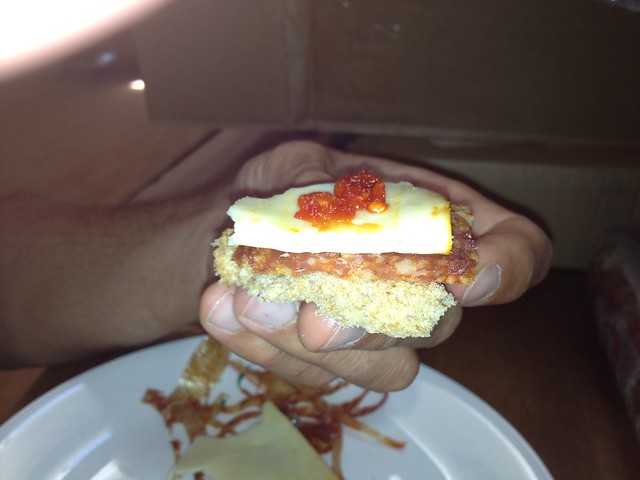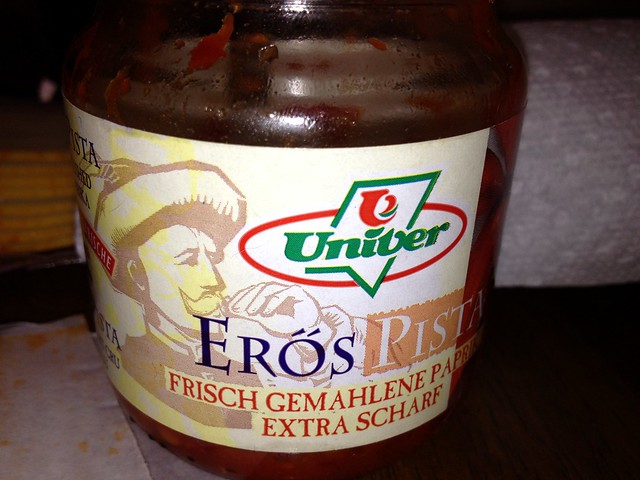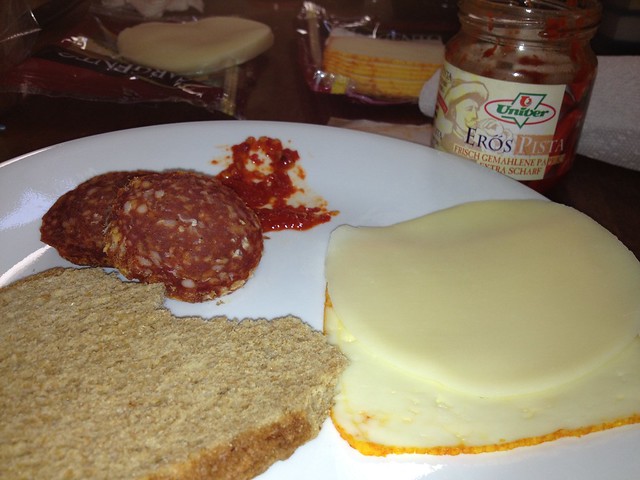Read What I Said in the Video:
Well hello there! I wanted to share with you a typical Hungarian breakfast. This is what Tamas and I had for breakfast today. Generally I don’t eat stuff like this because it’s full of saturated fat, but they really feel like a breakfast has to be a strong, heavy meal like this to get you through the first part of the day.
Tamas and I are always getting in fights actually about what breakfast is and I’m like, “Granola!” and he’s like, “Sausage!” But so here we have on the plate some sausage (salami), some cheese and some bread, along with a little pepper paste.
This pepper paste that they have, I’m gonna butcher the name, it’s something like Erős Pista, [eh-roosh peesh-taw] that means Strong Stevie. It’s just basically the brand name of the stuff, you can find it in every restaurant. It’s what they call a csípős paprika paste, which is like a spicy pepper paste. So whenever you hear the word paprika, now you know that that means “pepper” in Hungarian. That’s a very typical spice that they use in their cooking.
This is the way that Tamas eats these things for breakfast. He’ll make these little mini-bite sandwiches and he calls them “soldiers.” It’s so cute! Everybody calls them soldiers over there actually, they know what that means when you say that. And I learned that recently with him so he’s like, “Do you want me to make you a soldier?” and I’m like, “Of course!” So its a little bread, a little meat, and a little cheese and that is Tamas’ breakfast!












Why is the Cat Horoscope book not on this table during Hungarian Breakfast?!
I would prefer that not everyone in the world knows that I have such a fabulous book. Just protecting my assets, you know??
Thank you for sharing this,my daughter’s partner has Hungarian family I am meeting them soon and I wanted to know what was the common breakfast for them…my daughter is just going to make pancakes with strawberry s and cream if I am to take something with me (that they would appreciate) what should I take to add to the breakfast that my daughter is putting on for them…is there a better fruit they would like than strawberry s?also what sort of coffee or tea should I suggest my daughter buy for the guests?Also when meeting Hungarian people for first time is there any custom we should know about?Any help re- this welcome.Thanks from Kay
Hi Kay! I will help you as much as I can! :D Hope I’m not responding too late. It will be uncommon for them to have sweets for breakfast, but it will be great to introduce them to American culture, which is what we typically eat. They would love strawberries. My ex-husband loved Earl Grey with honey and lemon, so just typical teas will do. And they are just like Americans in most ways, except for hte first greeting. They will kiss you on the cheek instead of hugging, but a handshake might work well too, though it wouldn’t be typical.
Also, learn a couple of words and they will be beyond impressed – Hungarian is such a difficult language! Learn to say “Szia” when saying hello (which interestingly enough, sounds like “see ya”). And learn “koszonom szepen” which means Thank you very much. (“kuh-suh-num say-pen”) Just saying koszonom will work the same. If you say “koszi” which is short for koszonom, they will laugh because it is used informally between friends and family. Though stick with the formal version in the beginning. And lots of smiles!!
Hope this helps!! Enjoy and good luck!
Szia did come from the American greeting See ya, therefore meaning the same thing.
Ya know, Marta, I suspected that all along! So interesting! :D Tho they use it for hello as well as good-bye, which always threw me off. :D
Sorry to say but no, “szia” doesn’t come form the American “see ya”. It comes from Latin “servus”, “servus humillimus” and the older form is “szervusz”, or “szervusztok” in plural. It is now considered archaic even it’s other form, “szevasz” which is more informal: This was the used as “szeasz”, then as “sziasz” which was later shortened to “szia” for singular and “sziasztok” for plural.
There are many words in different languages that sound the same but have no actual common base. But you can use “hello” as well if you want to great someone. This definitely comes from English. This can also be used when saying good bye.
Thank you for sharing this
You’re welcome :)